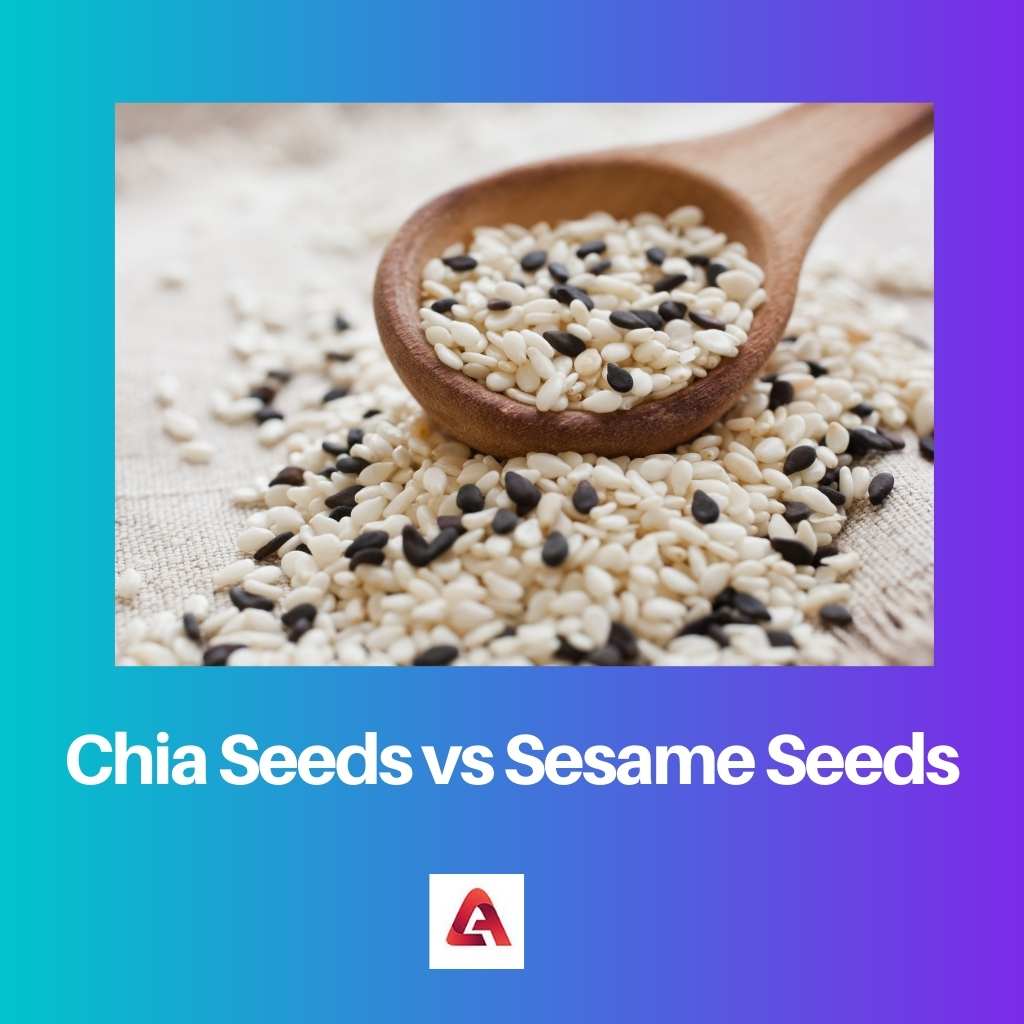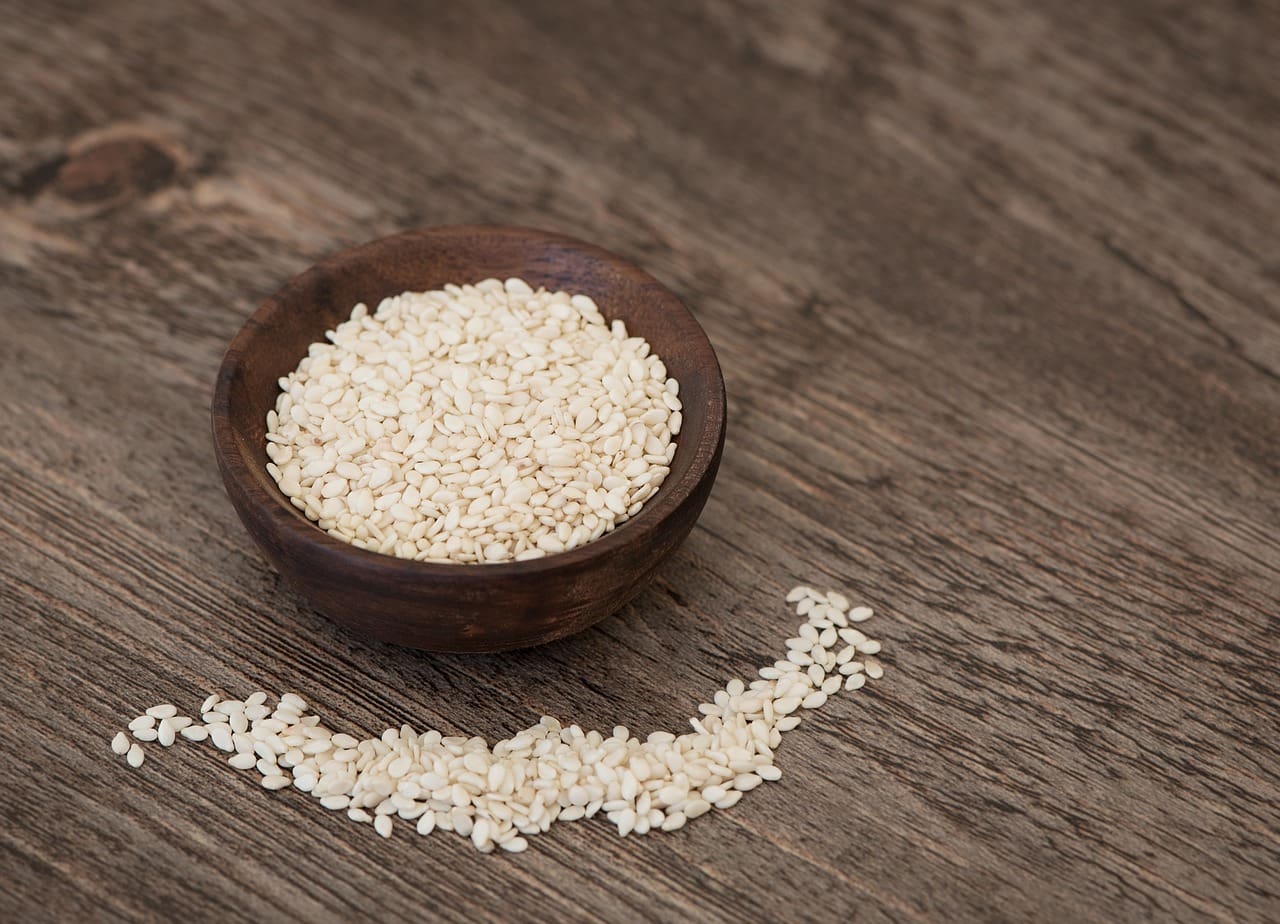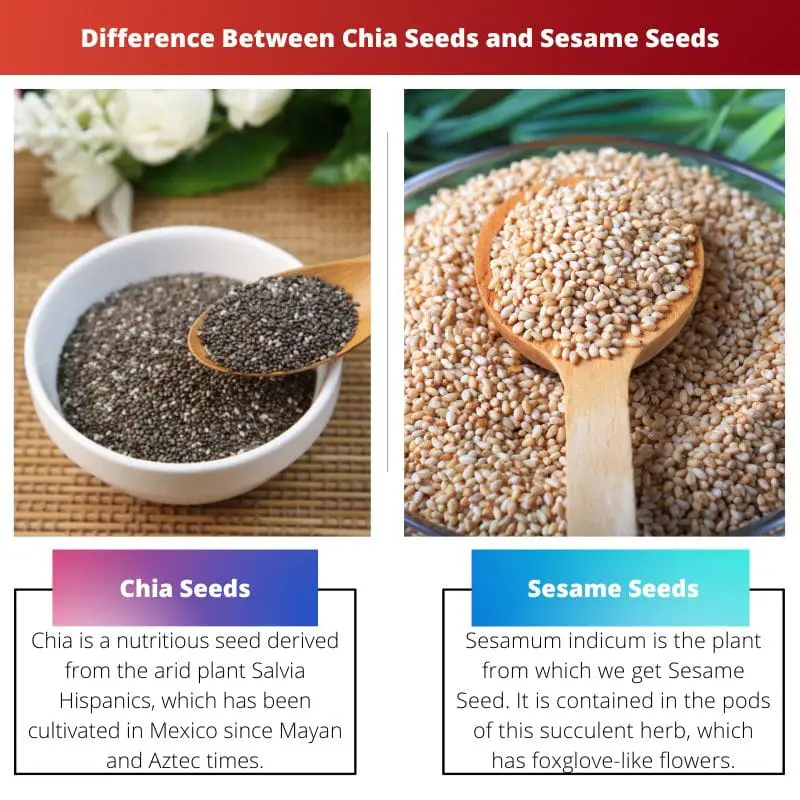Every day we consume different varieties of food, we eat food not only to satisfy our hunger but to gain energy and vitamins so that it will help us to fight against numerous diseases and keep us healthy.
There is a variety of food items that give us energy among them Chia Seeds and Sesame Seeds are the ones that are liked by many people as it contains a high amount of vitamin, proteins, carbohydrate, etc.
What is the difference between these seeds? what are its importance and health benefits? All these details are covered in this article.
Key Takeaways
- Chia seeds are small, nutrient-dense seeds from the Salvia hispanica plant, while sesame seeds come from the Sesamum indicum plant and are used for their oil and flavor.
- Chia seeds are rich in omega-3 fatty acids, fiber, and protein, while sesame seeds are high in healthy fats, calcium, and antioxidants.
- Chia seeds form a gel-like consistency when mixed with liquid, making them useful for thickening recipes. At the same time, sesame seeds have a nutty flavor and crunchy texture that enhances various dishes.
Chia Seeds vs Sesame Seeds
Chia seeds are a better source of omega-3 fatty acids, while sesame seeds are a better source of calcium. Chia seeds have a neutral flavor and develop a gel-like texture when soaked in liquid, while sesame seeds have a slightly nutty flavor and are used for their crunchy texture.

Chia is a nutritious seed derived from the arid plant Salvia Hispanics, which has been cultivated in Mexico since Mayan and Aztec times.
The word “chia” means “strength and these societies are said to have employed these small grey seeds as a vitality enhancer. Chia seeds are a strong diet with healthful omega-3 fatty acids, carbs, protein, fiber, vitamins, and calcium.
Sesamum indicum is the plant from which we get Sesame Seed. It is contained in the pods of this succulent herb, which has foxglove-like flowers.
Once the seeds are ready, the shells pop out with a loud pop. Because the hulls possess oxalic acid, which has a bitter taste, they are eliminated. Sesame oil can also be extracted from the seeds.
Comparison Table
| Parameters of Comparison | Chia Seeds | Sesame Seeds |
|---|---|---|
| Color | Grey with black and white specks | Black and White |
| Fats | Trans fat | Saturated fat. |
| Texture | Crunchy | Soft |
| Flavor | Nutty | Mild, sweet, and nutty |
| Shelf life | Shorter shelf life | Longer shelf life |
What are Chia Seeds?
Chia seeds are a historic nutrient-dense food that the Aztecs, Mayans, and American Indians have been cultivating for generations.
Due to “their rich protein and nutritional content, they were once regarded to be a “gift from the gods.” Many research studies have demonstrated the remarkable health advantages of Chia seeds.
In addition to their nutritional content, Chia seeds’ nutrient properties make them easy to absorb by the body, which promotes greater energy levels and aids in the retention of a balanced weight.
Chia seeds have a balanced flavor, so you may add them to your favorite meals without changing or dominating the flavor.
Apart from all these features, Chia seed is considered as one of the most essential components of our regular diet, as its antioxidants, vitamins, proteins help us to stay strong and healthy.
Below is the list of some health benefits that we get by consuming Chia seed:
- Contains a huge amount of nutrition: Chia Seeds are a powerhouse of nutrition, fiber, protein, healthy fats, and a variety of micronutrients abound in them, which keeps our body healthy.
- Helps to fight heat disease: Soluble fiber in Chia seeds can aid in the reduction of bad cholesterol levels in the blood. As a result, the chance of heart disease may be reduced.
- Helps to keep our bones strong: Calcium, magnesium, phosphorus, and other minerals are abundant in Chia seeds that enhanced bone mineral density and keep our bones strong and healthy.
- Beneficial for the people suffering from blood sugar: Chia seeds can assist regulate blood sugar levels, potentially due to their high fiber content and various advantageous components.
Best way to consume Chia Seeds: It can be consumed raw, soaked in juice, or blended into porridge, mousse, milkshakes, and baked products. You may also use them as a garnish on cereal, yogurt, veggies, and rice meals. They also perform well as a binding agent in handmade fritters.

What are Sesame Seeds?
Since 3000 B.C, sesame seeds have been farmed for their edible seeds, but they have also been used for over 3000 years in Chinese treatments.
The seeds are rich in antioxidants and nutrients, minerals, protein, and vital fatty acids, all of which are beneficial to our bodies.
Sesame seeds contain one of the greatest levels of oil of any seed. Sesame seeds are produced in the biggest quantities in India, Sudan, and Myanmar.
Its taste is rich and nutty, and they’re used in a variety of cuisines around the world. We utilize it as a seasoning as well as an edible oil source.
In Middle Eastern, Caribbean, and South Asian cuisines, it’s widely featured as a burger topping, sprinkling on a variety of Asian foods, and desserts.
Sesame Seed is a nutritional seed that is easily available in almost every kitchen; these seeds enhance the flavor and appearance of our food.
In addition to these, numerous health benefits are related to the Sesame Seed, some of its health benefits are listed below:
- Fight Dental problems: Oil pulling is the practice of twirling Sesame oil about in the mouth, covering the teeth and gums. Oil pulling is an exercise that helps to reduce dental plaque by disrupting pathogenic bacteria.
- Avoid cancer: Sesame seeds’ anti-oxidant characteristics, as well as the availability of minerals such as magnesium and iron, as well as various vitamins, appear to lower the incidence of some cancers.
- Safeguard against UV rays: Sesamol is a chemical found only in sesame seeds that assists in the protection against ultraviolet exposure.
- Beneficial for our skin and hair: Sesame seeds include particular nutrients and antioxidants that help to keep our skin and hair young and healthy.
Best way to consume Sesame Seeds: Sesame seeds can be consumed raw or toasted to enhance their inherent nutty flavor. Baked goods, bread buns, salads, and flatbread all have them as a condiment.
Salads can also be made using them. Crushed Sesame seeds are used to make tahini, which is a key component in hummus.

Main Differences Between Chia Seeds and Sesame Seeds
1. Chia seeds are an emulsifier that assists to combine an item’s oil and water composition, whereas Sesame seeds lack this ability.
2. Chia seeds have a high trans fat content, but Sesame seeds have a low trans fat content.
3. Chia seeds are abundant in Omega-3 fatty acids. While Sesame seeds are high in nutrients, iron, and protein, they are also high in fat.
4. Chia seeds can be sprinkled on food or included in smoothies, snack foods, curd, and breakfast porridge whereas Sesame seeds go into sesame paste, hummus, sesame oil, and burger condiments.
5. Chia Seed was first discovered in early 3500 BC while Sesame seed was discovered between 2700 and 1900 BC.

- https://www.sciencedirect.com/science/article/pii/S0956713520302905
- https://www.sciencedirect.com/science/article/pii/S030881462102361X




